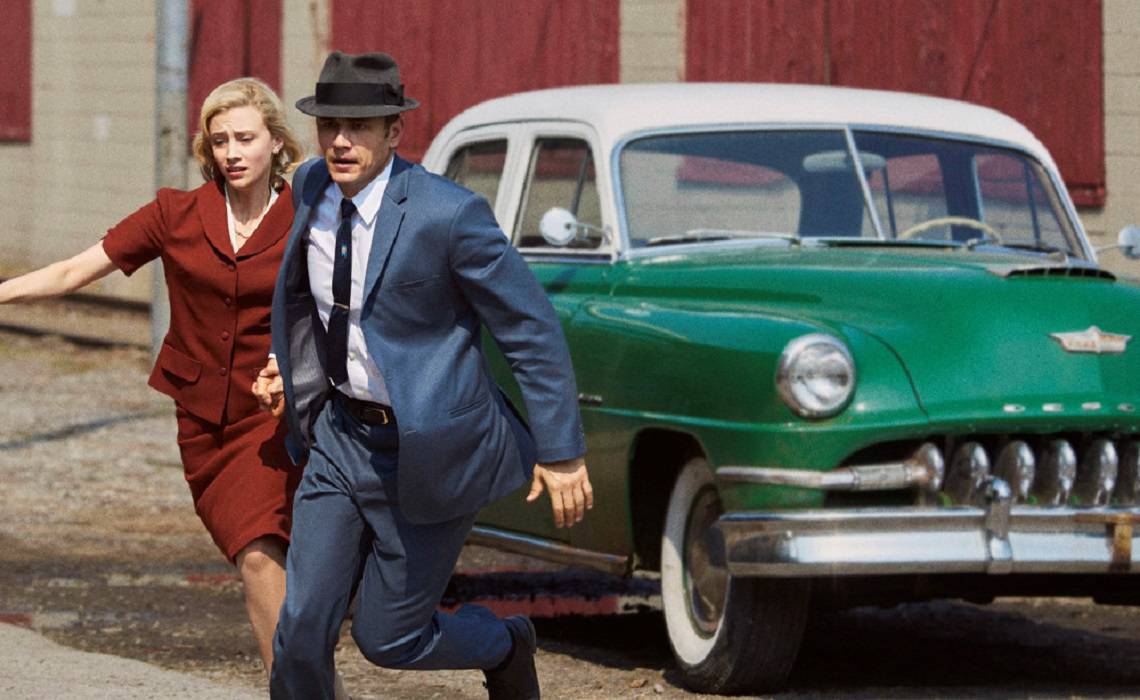The issue of whether or not candidates for the President of
the United States would go back in time and kill Adolf Hitler if given the
opportunity actually became a talking point late last year. Perhaps political
pundits were influenced by Stephen King’s 2011 hit book, “11/22/63,” which has
been turned into the biggest event series in the history of Hulu Original
Programming, released this Friday on the streaming service hoping to compete
with Netflix and Amazon for original offerings. Executive produced by J.J.
Abrams and featuring an all-star cast led by James Franco, “11.22.63” (the
series replaces slashes with dots, and also makes some pretty notable changes
to the narrative from what I can tell, greatly enhancing one character’s role) starts
off with an infectious energy, driven by the hook of its high concept and the
driven, genuine performance of its leading man. Around episode three, it starts
to sputter, and it honestly never quite gets back what works about the first
two episodes. It’s never boring—again, thanks to its star and some notable
technical accomplishments I’ll get to—but I kept waiting for “11.22.63” to really
click, to relay what so many loved about the book.
Jake Epping (James Franco) is an English teacher at a school
in Maine in the year 2011. He spends time at a diner run by Al Templeton (Chris Cooper). One
day, Al tells Jake the secret of the diner—it contains a portal to 1960. Al has
been travelling through the portal, spending as much time in the past as
possible in an effort to get to the titular date and stop the assassination of
John F. Kennedy. He hasn’t made it, and the journey has taken a toll, giving Al
cancer. You see the past fights against revisionism. Al is going to die shortly
but he wants Jake to take on this journey. Jake agrees, travelling back almost
a half-century and essentially settling down in Texas, where he plans to spy on
Lee Harvey Oswald (Daniel Webber). He can’t just kill him because what if he
wasn’t the lone gunman? So, he has to know for sure that stopping Lee will stop
the assassination, and that’s going to take time.
Of course, time allows the human element to intercede in our
best laid plans, and Jake meets a few important people. First, after a riveting encounter in
episode two in which Jake tries to stop a murderer (Josh Duhamel), he meets a
bartender named Bill (George MacKay), who learns his secret and joins him on
his journey, pretending to be Jake’s brother (and causing other problems along
the way). More importantly, he meets another teacher named Sadie (Sarah Gadon),
with whom he falls in love. Will his feelings for Sadie dissuade him from his
journey? What happens to Bill when all of this over? And will saving Kennedy
really make for a better 2016?

Clearly, there’s more than enough material here narratively
for an event series, but “11.22.63” starts to spin its wheels around episode
three. I didn’t read the book, but it’s easy to see how King could use his
prose to maintain the urgency of Jake’s quest or even the folksy charm of his
new existence in ways that just don’t translate to the small screen adaptation.
There’s a ticking clock element of “11.22.63” and the producers can’t decide to
how to handle it narratively. It would almost have been more interesting if
they discarded the “overall mission” of Jake’s journey for an episode or two
and just let us get to know Sadie and
the other people in his new life. Instead, the project feels kind of torn
between its purposes for a few episodes, unsure if it’s a character piece or a “Twilight
Zone” riff and not really enough of either. The piece comes alive again when
Sadie’s ex-husband (a menacing T.R. Knight) becomes a crucial character, but it
never quite regains the confidence of the first two episodes, even in its
gotcha finale.
While the construction of “11.22.63” holds it back from
greatness, Franco deserves credit for really committing to the high concept of
it all. A lot of actors betray projects like this by winking at the audience as
if they’re self-aware of how ridiculous it all really is, but not Franco. He’s
committed to the role in all of its oddity, even if I do wish Jake had a bit
more personality and didn’t feel like such a cog in the narrative machine.
Gadon also invests in her character a nice degree of depth. Both actors
are ably helped by fantastic production design from the great Carol Spier, a
regular collaborator of David Cronenberg (on “A History of Violence” and “Eastern
Promises,” notably), who makes the early ‘60s feel genuine and not just like
Hollywood sets. She’s the likely-to-be-unheralded MVP.
What would you do if you could change the past? And what if
your mission for world-altering change was derailed by something as pure and
simple as love? Conceptually, it’s easy to see why “11.22.63” really took off
with readers, and King’s gift as a writer surely carried readers over the bumpy
patches in which the adaptation follows and arguably trips up. Jonathan Demme was reportedly attached
to an adaptation at one point but wanted to change some things about the book
and left over creative differences. There’s a part of me that wants to go to Al’s
Diner and keep Demme on the project to see how that would have turned out.












